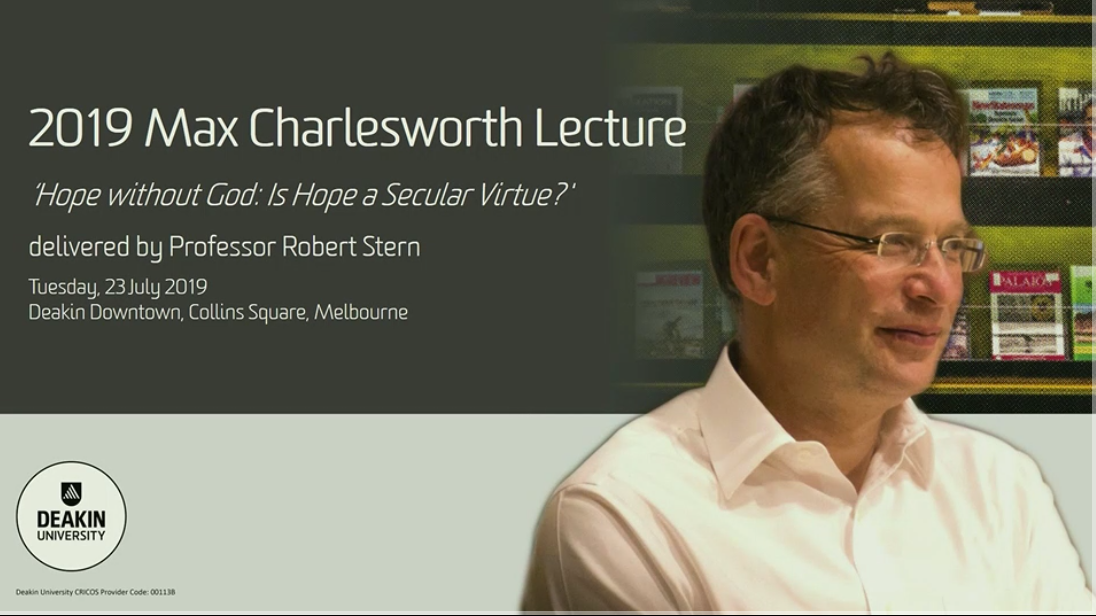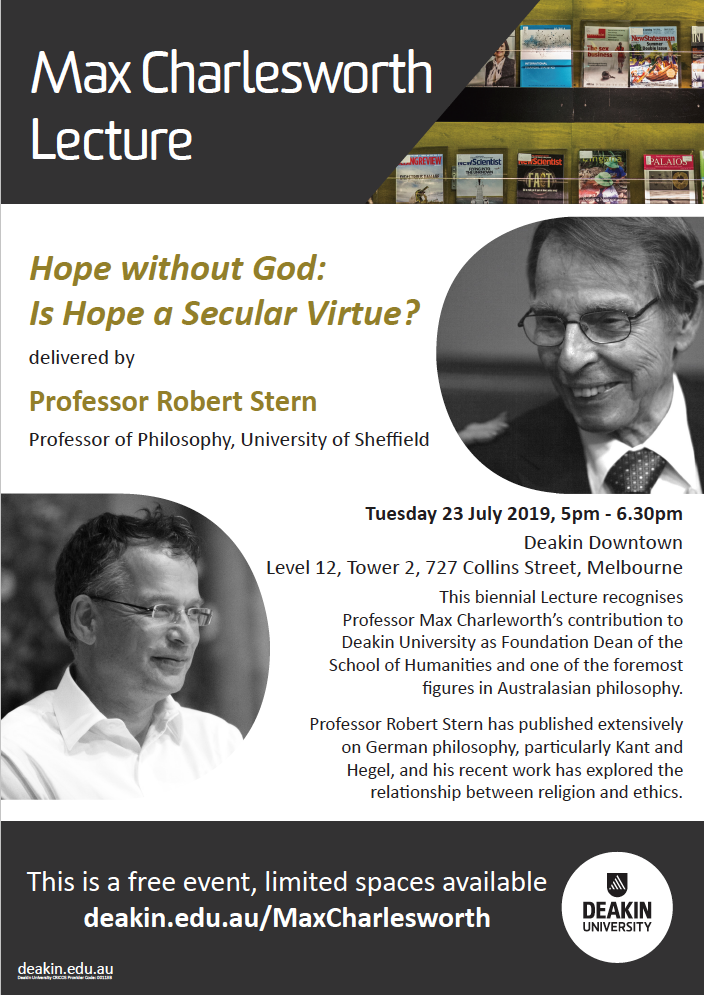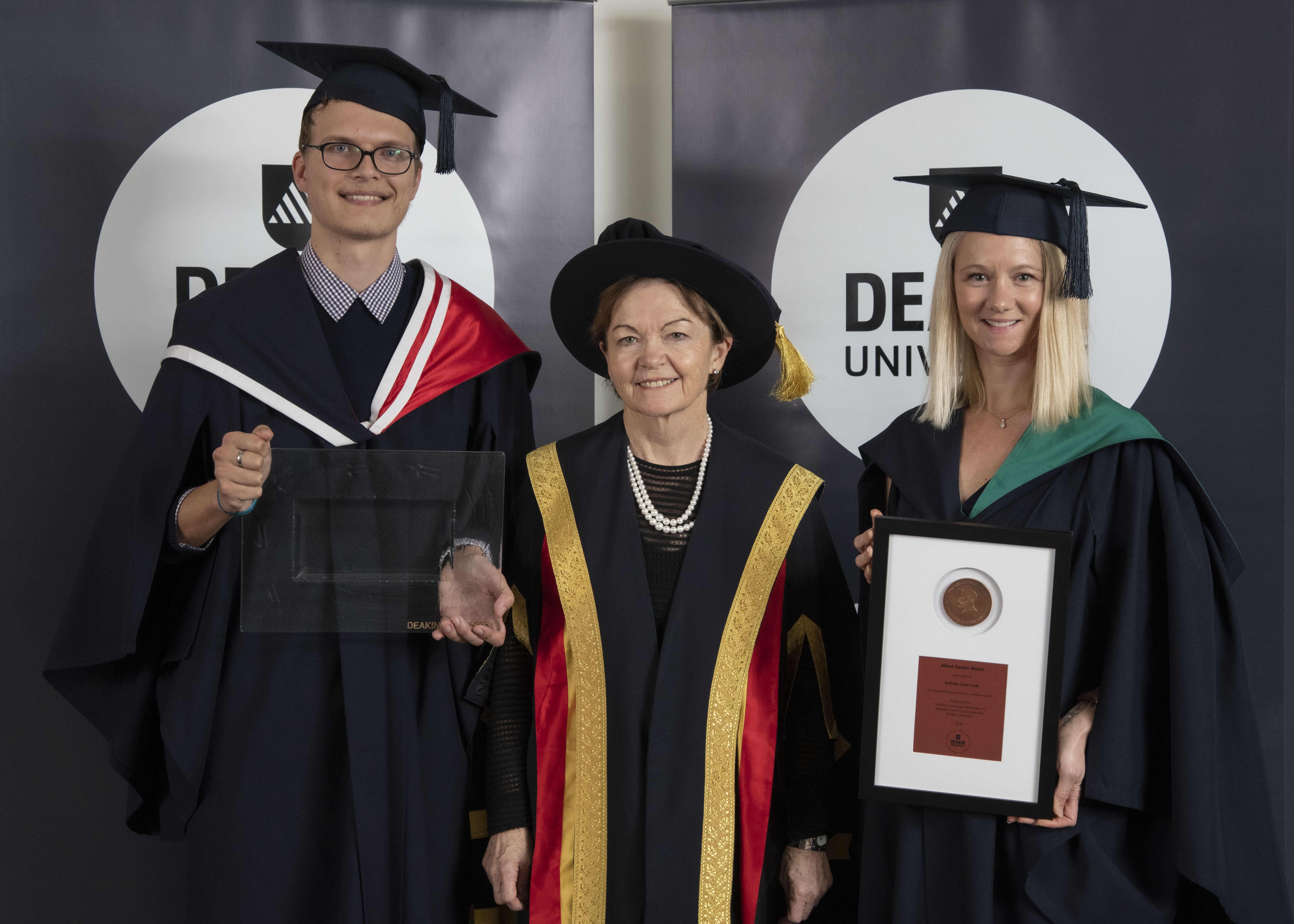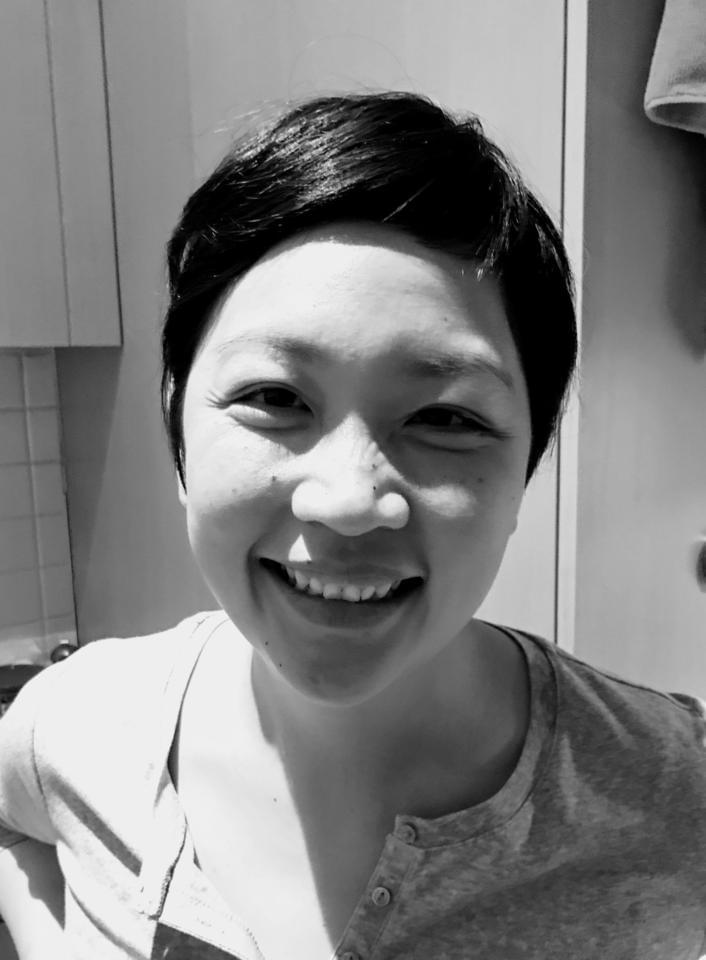 Check out the audio from our ‘Who Needs the Humanities?’ forum, held at NGV on 31st July 2019 and moderated by Dr Sean Bowden, here.
Check out the audio from our ‘Who Needs the Humanities?’ forum, held at NGV on 31st July 2019 and moderated by Dr Sean Bowden, here.
VIDEO: 2019 Max Charlesworth Lecture
 Click here to watch a recording of “Hope Without God: Is Hope a Secular Virtue?”, the 2019 Max Charlesworth Lecture, delivered by Prof. Robert Stern (University of Sheffield)
Click here to watch a recording of “Hope Without God: Is Hope a Secular Virtue?”, the 2019 Max Charlesworth Lecture, delivered by Prof. Robert Stern (University of Sheffield)
Who Needs the Humanities?
“It’s clear,” says Dr Bowden, “that the design of new, marketable technologies requires input from Humanities scholars who are well placed to understand the human dimensions and impacts of these technologies, and to articulate the ethical frameworks that should guide their functioning and use.”
On Wednesday 31st July, Deakin’s Dr Sean Bowden will be facilitating a panel discussion on the topic Who Needs the Humanities? at the NGV’s Clemenger Auditorium (tickets are still available via the link). Joining Sean will be:
- Prof Joy Damousi, Professor of History at the University of Melbourne and current President of the Australian Academy of the Humanities.
- Prof David Lowe, Alfred Deakin Professor and Chair in Contemporary History, Deakin University.
- Prof Robert Stern, Professor of Philosophy at the University of Sheffield and current President of the British Philosophical Association.
- Dr Miriam Bankovsky, Senior Lecturer in Politics and Director of the Bachelor of Politics, Philosophy and Economics, La Trobe University.
- Dr Emily Potter, Senior Lecturer in Literary Studies and Associate Head of School (Research) in the School of Communication and Creative Arts, Deakin University.
Ahead of the event, Dr Bowden and panelists spoke to Deakin’s Disruptr Magazine about defending a place for the humanities in the twentieth century.
The value of Humanities research might often be difficult to pin down. But this is only because it is as multi-dimensional as the human world in which we live.
Kiryll Prakapenka wins Vice-Chancellor’s Prize
Congratulations to Kiryll Prakapenka (left) for being awarded the 2019 Vice-Chancellor’s Prize, awarded to the top two Honours students in each Faculty. Kiryll’s honours thesis, “Intuitions as Evidence: Intuiting the Intuited,” explored the vital question of how intuitions function as evidence of philosophical propositions. Well done, Kiryll!
Dr Helen Ngo wins 2019 AAP Innovation in Inclusive Curricula Prize
We’re delighted to report that Dr Helen Ngo has been awarded the 2019 Innovation in Inclusive Curricula Prize by the Australasian Association of Philosophy, for her work on ASP214 Justice and Equality:
The judging panel unanimously decided to award the Prize for Innovation in Inclusive Curricula to Helen Ngo for her unit Justice and Equality. The first half of the unit focuses on grounding the students with a knowledge of the key movements in contemporary political philosophy, including utilitarianism, Rawlsian liberalism, libertarianism, Marxism, and communitarianism. In the second half the focus turns to racism, decolonial justice, feminism, transgender identities, and disability.
Rather than looking at these topics in isolation from the philosophical movements explored in the first half of the unit, Ngo links the new topics to political philosophy as traditionally conceived. For instance, Marxism is connected to decolonial justice through the work of Frantz Fanon; Rawlsian liberalism is discussed in relation to racism through the work of Charles Mills. The new topics are also discussed in relation to each other. For example, the week on transgender identities is related back to the week on feminism, and the tensions between feminist and transgender activism are explored, as are the possibilities for trans-feminist solidarity.
Ngo has radically altered the unit from previous years, assigning authors from a variety of underrepresented and marginalised groups. The unit also encourages the students to engage with real-world issues that are traditionally overlooked in undergraduate units in political philosophy. Ngo makes the case that these issues can both illuminate and pose serious challenges to existing political theories. Her unit is an excellent example of how to design a philosophy course that encourages diversity and inclusivity.
Congratulations Helen!
Who Needs the Humanities?
A Forum on the Value of Research in the Humanities
July 31, 5-7pm
Clemenger Auditorium, NGV International, 180 St Kilda Rd, Melbourne (North Entrance)
Opening address by Prof Aaron Russell and moderated by Dr Sean Bowden.
The speakers are:
- Prof Joy Damousi, Professor of History, University of Melbourne, and current President of the Australian Academy of the Humanities.
- Prof David Lowe, Alfred Deakin Professor and Chair in Contemporary History, Deakin University.
- Prof Robert Stern, Professor of Philosophy, University of Sheffield.
- Dr Miriam Bankovsky, Senior Lecturer in Politics, La Trobe University.
- Dr Emily Potter, Senior Lecturer in Literary Studies and Associate Head of School (Research) of Communication and Creative Arts, Deakin University.
The event is supported by PHI, the Contemporary Histories Research Group and the Faculty of Arts and Education, Deakin University.
While the event is free to attend, registrations are necessary. Please register your attendance here.
For any inquiries, please contact Sean Bowden ([email protected]).
Join us for the 2019 Max Charlesworth Lecture
Deakin Philosophy is once again proud to present the Max Charlesworth Lecture:
 For details or to register, visit the event page.
For details or to register, visit the event page.
Documentary: ‘Last Light’
“Some events refuse to settle into the stories we tell about them. Instead of resolving, Fred’s story simply orbits, back here, to Cape Otway.”
Deakin Philosophy’s A/Prof Patrick Stokes has recently produced a radio documentary, ‘Last Light: The Valentich Mystery‘ for ABC Radio National’s ‘The History Listen.’ It’s available for download now, and will broadcast at 11am Tuesday 4th June and 5:30pm Saturday 8th June.
Deakin Philosophy success in ERA
Deakin Philosophy has been awarded a result of 4, ‘Above World Standard’ in the Excellence in Research Australia (ERA) assessment exercise conducted by the Australian Research Council. The full report is available here.
In the ARC’s parallel Engagement and Impact assessment, Deakin scored ‘High’ for Engagement in Philosophy and Religious Studies. This report can be read here.
We’re delighted at this strong result. Thanks to all the Deakin philosophers, past and present, who have brought us to this point.
Book Launch: Unsettling Food Politics
 Dr Christopher Mayes‘ new book, Unsettling Food Politics, is having a launch at the Institute for Post Colonial Studies (78-80 Curzon St North Melbourne) on 9th May at 7:30pm.
Dr Christopher Mayes‘ new book, Unsettling Food Politics, is having a launch at the Institute for Post Colonial Studies (78-80 Curzon St North Melbourne) on 9th May at 7:30pm.
The launch will involve a panel discussion with Stefano de Pieri, Lauren Rickards and Nick Rose followed by some food and drinks. Click here for more details, and register via Eventbrite.
You can also hear Christopher talking about the book on the Deakinstruction podcast.

